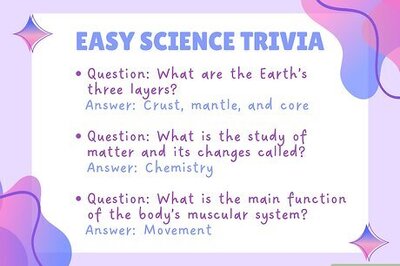
views
What is the meaning of “Jazakallah khair”?
“Jazakallah khair” translates to “May Allah reward you with goodness.” “Jazakallah khair” (جزاك اللهُ خيرً) is an Arabic expression that is mostly used by Muslims. This polite phrase is similar to “shukran” (the Arabic word for “thank you”) and expresses your heartfelt gratitude to someone who helped you out, showed you kindness, gave you a gift, or congratulated you about something. In Arabic, Jazakallah means “May Allah reward you” and khair means “good” or “goodness.” Can you shorten the phrase? Some people shorten the phrase to just “Jazakallah,” but most people consider this incomplete, as it doesn’t clarify how Allah is rewarding the person—it could be good or bad. So, “Jazakallah khair” is seen as the full, correct phrase. Example sentences: “Jazakallah khair. I really appreciate you helping me move in.” “You’re too kind, you didn’t have to get me a gift! Jazakallah khair.”
When and How to Use “Jazakallah Khair”
Say “Jazakallah khair” to give thanks to family, friends, and other Muslims. “Jazakallah khair” is a kind and respectful phrase that you say when someone helps, supports, or celebrates you. Because this phrase calls upon Allah to reward the person for their help, you typically only use it among other Muslims—whether they’re family, friends, authority figures, or strangers. “Jazakallah khair for everything, Fatima. I don’t know what I’d do without you.” “I appreciate the ride to work! Jazakallah khair.”
How to Say “Jazakallah Khair” to Men, Women, or Groups
“Jazakallah khair” has variations depending on who you’re talking to. Like in other languages, you'll need to adjust the phrase depedning on whether you're addressing a man, woman, or group: If you’re talking to a man, say “Jazakallah khair.” If you’re talking to a woman, say “Jazakillah khair.” If you’re talking to a group of people (men, women, or mixed), say, “Jazakumullah khair.”
How to Respond to “Jazakallah Khair”
Say “Wa iyyaka” to a man or “Wa iyyaki” to a woman. When someone thanks you by saying, “Jazakallah khair,” respond back with “Wa iyyaka” or “Wa iyyaki,” depending on their gender. Both of these polite phrases translate to “And to you, too.” Them: “I appreciate you helping me with the homework! Jazakallah khair.” You: “Wa iyyaka, Samir. Helping you helped me understand it better!” If you’re responding to a group (men, women, or mixed), say “Wa iyyakum.”
Respond with “BarakAllahu feek.” “BarakAllahu feek” means “My Allah bless you” in Arabic. This is a kind way to acknowledge the person’s gratitude and give your thanks right back. Them: “Thank you for your kind words at the meeting today. Jazakallah khair.” You: “BarakAllahu feek. I appreciate the time you took to meet with us.” If you’re speaking to a man, say “BarakAllahu feeka.” If you’re talking to a woman, say, “BarakAllahu feeki.” If you’re addressing a group, say, “BarakAllahu feekum.”
Say, “Wa Antum fa Jazakumullahu Khairan” in formal situations. If you’re at a formal occasion or responding to “Jazakallah khair” from an elder or authority figure, use the longer phrase “Wa Antum fa Jazakumullahu Khairan.” This polite and respectful expression translates to “And to you too, may Allah reward you with goodness.” Them: “Thank you for volunteering with us. Jazakallah khair.” You: “Wa Antum fa Jazakumullahu Khairan. You are doing amazing work in the community.”
Religious Significance of “Jazakallah Khair”
“Jazakallah khair” is mentioned in the hadith. The hadith is a collection of sayings attributed to the Prophet Muhammad (peace be upon him). In one hadith, Usamah bin Zaid (May Allah be pleased with them) reported, “The Messenger of Allah (ﷺ) said, ‘He who is favoured by another and says to his benefactor: ‘Jazak-Allah khairan (may Allah reward you well)’ indeed praised (the benefactor) satisfactorily.’” [Riyad as-Salihin 1496, Book 16, Hadith 32] This hadith explains why saying “Jazakallah Khair” is important and a good way to express your gratitude.




















Comments
0 comment